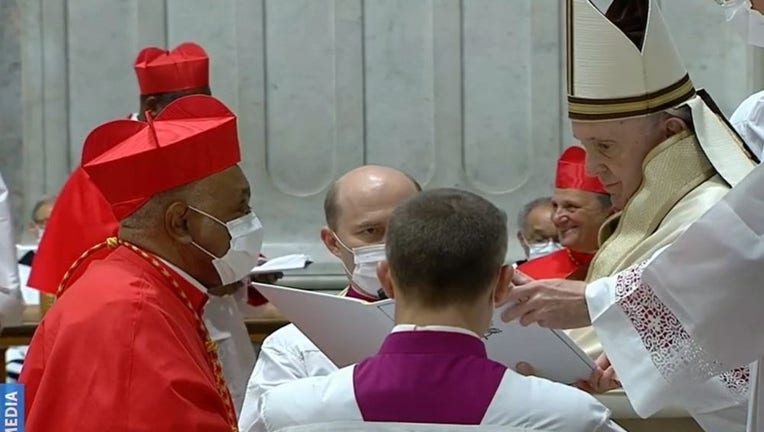Pope elevates 13 new cardinals, including first African-American, in ceremony marked by COVID

Pope Francis appoints Archbishop of Washington Wilton Gregory a cardinal in a ceremony Saturday at the Vatican. Gregory is the Catholic Church's first African-American cardinal. (Vatican Media)
ROME - Pope Francis is preparing to formally elevate 13 new cardinals, including the first African-American to receive the rank, in a ceremony marked in every way by the coronavirus pandemic: Two of the cardinals stayed home, the rest eschewed the usual celebrations and St. Peter’s Basilica was practically empty for Saturday’s service.
The ceremony, known as a consistory, is the seventh of Francis’ pontificate and once again reflected the Argentine pope’s effort to name cardinals from places that have never had them before or whose service to the church he wants to highlight. Nine are under age 80 and eligible to vote in a conclave to elect a new pope, further solidifying the majority of Francis-appointed prelates in the College of Cardinals.
Cardinal-designate Wilton Gregory, archbishop of Washington D.C., is becoming the first African-American cardinal. He told The Associated Press ahead of the ceremony that he viewed his appointment as “an affirmation of Black Catholics in the United States, the heritage of faith and fidelity that we represent.”
RELATED: Black D.C. archbishop’s rise marks a historic moment
Gregory’s appointment comes after a year of racial protests in the U.S. sparked by the latest killing of a Black man by a white police officer. Francis has endorsed the protests and cited the American history of racial injustices.
“There is awareness now of the need for racial reconciliation, an awareness that I have not seen at this level and at this intensity before,” Gregory said.
Another social justice-minded cardinal is the retired archbishop of Chiapas, Mexico, Cardinal-designate Felipe Arizmendi Esquivel, who has championed the rights of Mexico’s indigenous peoples and spearheaded efforts to translate the Bible and liturgical texts into native languages.
Francis visited Chiapas in 2016 and has long championed the rights of indigenous peoples. “That could be one of the reasons (he made me a cardinal) but I can’t confirm it,” Esquivel said during a Zoom call.
The Vatican’s in-house theologian-preacher, Cardinal-designate Raniero Cantalamessa, is also getting a red hat, but he successfully argued against being made a bishop as well, saying at his age — 86 — he couldn’t take on the responsibility.
The ceremony was taking place against the backdrop of the COVID-19 pandemic, which erupted in Italy in February and has seen a resurgence this fall. The Vatican is under a modified lockdown, with the Vatican Museums shuttered and Francis’ public general audiences cancelled. Instead he holds them in private, livestreamed.
The cardinal candidates and other who came to Rome from afar for Saturday’s service were required to undergo 10 days of Vatican-mandated quarantine at the pope’s hotel, where meals were brought to their rooms, Zoom calls provided contact with the outside and the cardinals’ new red robes were hand-delivered by Rome’s famed ecclesial tailors.
Usually, consistories are full of parties and crowds, with days of receptions, Masses and dinners for the new cardinals and their friends. Usually, the consistory itself would be followed by “courtesy visits,” where the new cardinals greet well-wishers and the general public from the grandeur of their own reception rooms in the Apostolic Palace or Vatican auditorium. This year, there will be no courtesy visits, and each cardinal was given a 10-guest limit.
With Saturday’s new cardinals, Francis has named 73 of the 128 voting-age cardinals, compared to 39 for Pope Benedict XVI and 16 for St. John Paul II. While the outcome of a future conclave can never be predicted, it’s not a stretch to suggest that a hefty majority of today’s electors presumably share the pastoral and doctrinal attitudes of the pope who named them.
The geographical makeup of the College of Cardinals has also shifted under Francis away from Europe, though Europe remains the greatest voting bloc with 53 electors. The Americas - North, Central and South and the Caribbean - together have 37 cardinal electors, even though an estimated 40% of the worlds Catholics live in Latin America and the Caribbean.
Saturday’s consistory is unusual for the high number of Italians who have been named, though three of them are over age 80 and thus ineligible to vote. But Italy still leads the college with more cardinals than any other country, with 22 voting-age prelates.
Francis has continued the trend of naming cardinals from the “peripheries” of the Catholic Church: Brunei got its first-ever cardinal with the Vatican’s ambassador to the country, Cardinal-designate Cornelius Sim.
Rwanda also got its only cardinal with the archbishop of Kigali, Antoine Kambanda, whose family was slaughtered during the Rwandan genocide. Kambanda made the trip to Rome for the ceremony, Sin stayed home due to COVID-19 restrictions.
History’s first Jesuit pope has also increased the number of cardinals who belong to religious orders, naming three Franciscans this time around in a year in which the pope, who named himself after St. Francis of Assisi, released an encyclical inspired by the saint’s call to fraternity and solidarity with the weakest.
RELATED: Archbishop of Washington named first African-American cardinal
Some Catholics in the nation's capital were delighted at the sign of social progress within the Church.
“It’s long overdue. Absolutely. There’s no doubt that,” said Rohan Selvaratnam, after he came out of St. Matthew the Apostle’s Saturday morning mass in Northwest DC.
When asked if it matters, Selvaratnam excitedly said, “Of course it does! You feel you’re a part of it. And it’s a welcomed opportunity.”
Kensl Bailey attended the same service.
“That means that every person is our church is equal,” said Bailey, “And Pope Francis, by doing this, has let the entire world know, as it says in the Bible, we’re all equal. And that we’re open for business for everybody.”
FOX 5 DC's Stephanie Ramirez contributed to this report.

